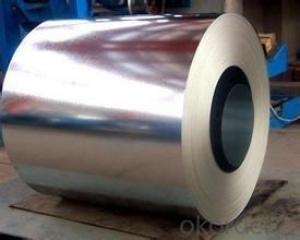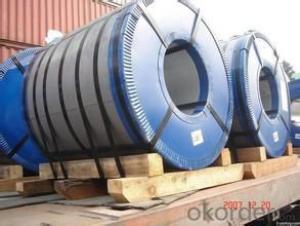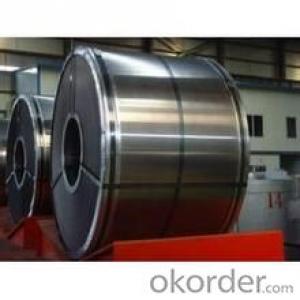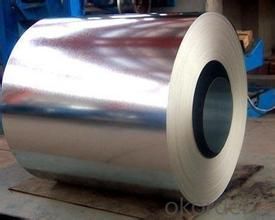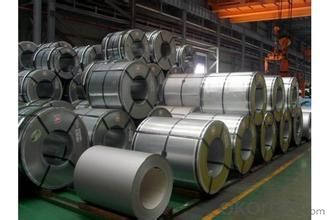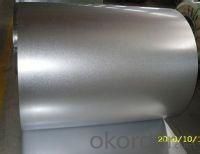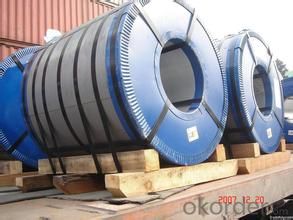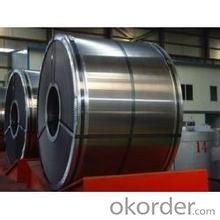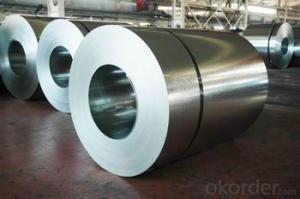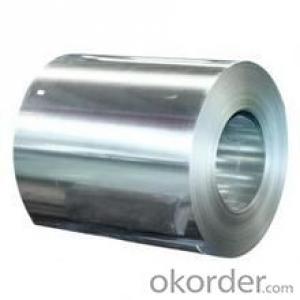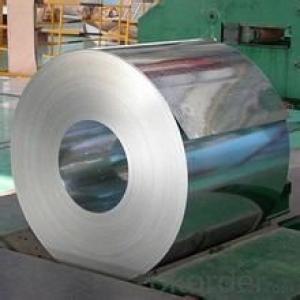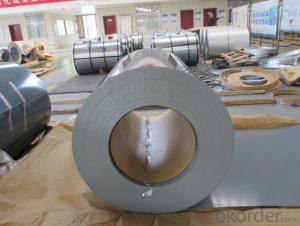hot-dip galvanized steel coil SGCC in China
- Loading Port:
- China main port
- Payment Terms:
- TT OR LC
- Min Order Qty:
- 30 m.t.
- Supply Capability:
- 5000000 m.t./month
OKorder Service Pledge
OKorder Financial Service
You Might Also Like
Description:
1.Mateials:SGCC,DX51D / DX52D /S250,280GD
2.Size:width:600-1250mm(900mm,1215mm,1250mm,1000mm the most common)
thickness:0.15-2.0mm
length:1000-6000mm,as your require
3.Zinc coating :60-180g( as required)
4.Coil id:508mm
5.Coil weight: 3-5MT(as required)
6. Surface:regular/mini/zero spangle, chromated, skin pass, dry etc.
Applications of our Galvalume Coil:
Galvalume Coil widely used for roofing products, It is also the ideal base material for Prepainted Steel Coil.
1. roofing
2. gutters
3. unexposed automotive parts
4. appliances
5. furniture
6. outdoor cabinetry
Production of cold formed corrugated sheets and profiles for roofing, cladding, decking, tiles, sandwich walls, rainwater protective systems, air conditioning duct as well as electrical appliances and engineering.
- Q: What is the width range of steel coils?
- The width range of steel coils can vary depending on the specific requirements and industry standards, but generally, it can range from a few millimeters to several meters.
- Q: How are steel coils inspected for surface finish?
- Steel coils are typically inspected for surface finish using visual inspection techniques and specialized equipment such as surface roughness testers, gloss meters, and profile scanners. These methods help to assess the coil's smoothness, texture, and appearance, ensuring it meets the required surface finish specifications.
- Q: What are the dimensions of a steel coil?
- The dimensions of a steel coil can vary depending on its intended use and manufacturer. However, typical dimensions include a width ranging from 600mm to 2,200mm, a diameter of 600mm to 2,000mm, and a weight ranging from a few hundred kilograms to several metric tons.
- Q: What is the difference between steel coils and steel sheets?
- Steel coils and steel sheets, although both forms of steel, exhibit distinct differences. Steel coils, which are long rolls of steel wound into a coil shape, are typically produced at a steel mill and serve as raw materials for further processing or manufacturing. Various industries, including automotive, construction, and appliance manufacturing, commonly utilize steel coils in the production of items such as pipes, tubes, and automotive parts. Conversely, steel sheets are flat pieces of steel that are typically derived from steel coils. These sheets come in different sizes and thicknesses, making them versatile for various applications. Construction projects, such as roofing, siding, and structural components, often employ steel sheets. Additionally, they are utilized in manufacturing processes like stamping, forming, and fabricating diverse products. One primary distinction between steel coils and steel sheets lies in their shape and form. Steel coils adopt a cylindrical, rolled form, whereas steel sheets possess a flat, rectangular structure. This dissimilarity in shape renders steel coils more suitable for continuous production processes, while steel sheets find application in scenarios that demand flat surfaces. Another variation pertains to the handling and transportation of these steel forms. Due to their large size and weight, steel coils necessitate specialized equipment like coil cars or cranes for transport and storage. Conversely, steel sheets can be conveniently stacked, transported, and stored using conventional methods. Lastly, the processing requirements for steel coils and steel sheets differ. Steel coils often undergo additional processing steps, such as slitting, cutting, or coating, to meet specific customer requirements. Conversely, steel sheets may require minimal processing before being utilized in their intended applications. In summary, steel coils and steel sheets exhibit variances in shape, handling, transportation, and processing requirements. Steel coils, in their rolled, cylindrical form, are utilized for further processing, while steel sheets, cut from coils, serve specific applications. Recognizing these distinctions is crucial when selecting the appropriate steel form for a particular project or manufacturing process.
- Q: Can steel coils be coated with chrome?
- Yes, steel coils can be coated with chrome.
- Q: What is the difference between cold rolled strip and cold rolled steel coil?
- Single literal explanation, volume and band are different, appearance shape is not the same.
- Q: How are steel coils used in the production of household goods?
- Steel coils are an essential component in the production of various household goods. These coils are typically made from high-quality steel and are manufactured to specific dimensions and thicknesses to meet the requirements of different products. One of the primary uses of steel coils in household goods production is in the manufacturing of appliances such as refrigerators, washing machines, and dishwashers. The coils are used to create the body and framework of these appliances, providing strength, durability, and stability. Additionally, steel coils are often used in the production of smaller household appliances like toasters, blenders, and coffee makers. Furthermore, steel coils are also used in the production of furniture, particularly in the manufacturing of metal frames for chairs, tables, and cabinets. These coils provide the necessary support and structural integrity to the furniture, ensuring long-lasting durability. Another significant application of steel coils in household goods production is in the production of shelving units and storage solutions. Steel coils can be shaped and formed to create sturdy shelves and racks that can hold heavy items and withstand regular use. These shelves are commonly used in kitchens, garages, and storage rooms to organize and store various household items. In summary, steel coils play a crucial role in the production of household goods. They are used to create the framework, structure, and support for appliances, furniture, and storage solutions. Their strength, durability, and versatility make them an ideal material for manufacturing a wide range of household products that are designed to withstand everyday use.
- Q: How are steel coils used in the manufacturing of automotive springs?
- Steel coils are used in the manufacturing of automotive springs as they provide the necessary strength and flexibility required to support the weight of the vehicle and absorb shocks and vibrations. The steel coils are shaped and tempered to specific dimensions and then coiled to form the springs, which are then installed in various parts of the vehicle's suspension system to ensure smooth and stable ride quality.
- Q: And by how much? I'm pretty sure that sterling silver is stronger, but I'm wondering if I could still use a metal stamp to stamp into something that's stainless steel - if it would be soft enough?
- No way steel is by far stronger. Tensile strength of Sterling silver 207 MPa Tensile strength of Stainless Steel 515 MPa
- Q: Hi there! I just purchased two cookie sheets labeled as non-stick 100% carbon steel. I've never heard of carbon steel before, and I'm trying to be careful about not using certain products that are harmful to health such as aluminum and Teflon. Is this a safe metal choice for baking?
- Yes. Carbon steel is one of the most common metals used by human beings. When the Bronze Age ended and the Iron Age started, most of the iron humans could make was carbon steel. A Cast Iron frying pan is carbon steel (well... technically, there are differences between cast irons and steels but... anyway). Our cast iron frying pans (almost the only fry pans we have used for 30+ years) are mostly non-stick because we keep them well seasoned. Humans need iron in our diet anyway. You might want to check to verify what (if anything) it is coated with to make it Non-stick because, in general, steel cookware is stick. If it is coated with ceramic (enameled), then there won't be any rust because the iron is coated and protected from water. The non-stick ceramic coatings are very good. Ceramics are chemically inert to almost everything on earth (all but some of the most exotic chemicals you will ever find in a Chem Lab). As a side note... a large number of studies of industrial exposure to aluminum and aluminum compounds (people who work in Al production plants and are exposed to large quantities for years and years and years) has shown that there is NO correlation with Alzheimers or any other diseases. The major health risk for these populations was lung problems due to inhalation of fine dust (which, turned out, was not even as bad as breathing, for example, dust containing cotton fibers in garment workers).
Send your message to us
hot-dip galvanized steel coil SGCC in China
- Loading Port:
- China main port
- Payment Terms:
- TT OR LC
- Min Order Qty:
- 30 m.t.
- Supply Capability:
- 5000000 m.t./month
OKorder Service Pledge
OKorder Financial Service
Similar products
Hot products
Hot Searches
Related keywords
